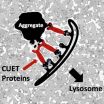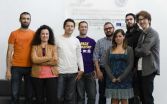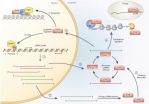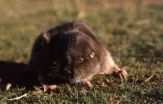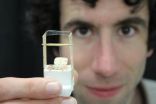(Press-News.org) This news release is available in German.
Proteins, the components of our body that execute, control and organize basically all functions in our cells, are made out of strings of amino acids, which – like an origami - are folded into specific and complex three-dimensional structures according to their desired functions. However, since folding and maintaining of such structures is highly sensitive to cellular or environmental stress, proteins can potentially misfold or form clumps (aggregates). Such undesired protein waste can be toxic for cells and may even lead to cell death. Because several human neurodegenerative diseases are known to be linked to an accumulation of abnormal protein aggregates, basic science aimed to understand how cells remove cellular garbage is elementary for designing strategies for a potential prevention or cure of such disorders.
Scientists in the laboratory of Stefan Jentsch at the MPIB now successfully used baker's yeast for screening for new cellular waste disposal pathways. Kefeng Lu, a postdoctoral researcher from China, discovered a new class of helper proteins (termed CUET proteins) present both in yeast and humans that recognize cellular garbage earmarked for disposal by an attached label in the form of the ubiquitously existing protein known as "ubiquitin". Importantly, these newly identified helper proteins channel the cellular garbage by a "self-eating" pathway (autophagy) to the lysosome, a compartment of cells dedicated for destruction and recycling. The Max Planck scientists could also show that a toxic protein related to the abnormal, aggregate-forming protein "huntingtin" of patients with the neurodegenerative Huntington's disease is efficiently destroyed by the newly identified pathway. Remarkably, this pathway seems specific for aggregated proteins like huntingtin and appears to be more potent than previously discovered cellular garbage disposal mechanisms.
Because the identified cellular disposal mechanism operates in yeast as well, the researches will now take full advantage of its powerful experimental possibilities to investigate this pathway further. A detailed analysis of this mechanism will be crucial to understand how aggregate-forming proteins lead to human diseases and may help to develop concepts for possible disease preventions.
INFORMATION:
Original Publication:
K. Lu, I. Psakhye and S. Jentsch: Autophagic clearance of polyQ proteins mediated by the conserved CUET protein family. Cell, July 17, 2014.
DOI: 10.1016/j.cell.2014.05.048
Contact:
Prof. Dr. Stefan Jentsch
Molecular Cell Biology
Max Planck Institute of Biochemistry
Am Klopferspitz 18
82152 Martinsried
Germany
E-Mail: jentsch@biochem.mpg.de
http://www.biochem.mpg.de/jentsch
Anja Konschak
Public Relations
Max Planck Institute of Biochemistry
Am Klopferspitz 18
82152 Martinsried
Germany
Tel. +49 89 8578-2824
E-Mail: konschak@biochem.mpg.de
http://www.biochem.mpg.de/news
A new cellular garbage control pathway with relevance for human neurodegenerative diseases
2014-07-18
ELSE PRESS RELEASES FROM THIS DATE:
New inexpensive and easy computer software provides real-time and highly accurate data on traffic
2014-07-18
Researchers at the University of Granada have designed new software that provides real time data on traffic. It is a device that provides information on traffic flow between cities. Drivers can use this information to choose the fastest route as they plan to drive to their destinations.
It is a highly reliable, low-cost method, easy and quick to install, which uses bluetooth devices. These devices collect real-time data on road traffic which it then sends to a central server. This information is then processed using complex data mining algorithms, evolutionary computing ...
Consuming probiotics for a month helps diminish fat accumulation in the liver, new study says
2014-07-18
Spanish scientists have demonstrated through an experiment on obese rats that the consumption of probiotics during thirty days helps diminish the accumulation of fat in the liver. This new finding, published today by the journal PLOS ONE, is a great step forward on the fight agains the Non-Alcolohic Fatty Liver Disease (NAFLD), which is closely related to obesity and diabetes.
Researchers from the 'Nutrition Biochemistry: Theurapetic Applications' group (CTS-461) and the José Mataix Institute for Nutrition and Food Technology at the University of Granada have demonstrated ...
No evidence that California cellphone ban decreased accidents, says Colorado University Boulder researcher
2014-07-18
In a recent study, a researcher at the University of Colorado Boulder found no evidence that a California ban on using hand-held cellphones while driving decreased the number of traffic accidents in the state in the first six months following the ban.
The findings, published in the journal Transportation Research Part A: Policy and Practice, are surprising given prior research that suggests driving while using a cellphone is risky. For example, past laboratory studies have shown that people who talk on a cellphone while using driving simulators are as impaired as people ...
The differentially expressed genes in DRG that influence neural regeneration after SNI
2014-07-18
Slit-Robo GTPase-activating protein 3 contains a Rho GAP domain that regulates the activities of Rho family GTPases and affects actin polymerization, which influences dendrite elaboration, neurite outgrowth and axon guidance, contributing to neural regeneration. Anjie Lu, the Third Xiangya Hospital of Central South University, China and his team performed a microRNA microarray analysis and identified 23 microRNAs whose expression were significantly changed in rat dorsal root ganglia (DRG) after sciatic nerve injury (SNI). Bioinformatic analysis was used to determine microRNA-214 ...
The human δ2 glutamate receptor gene is not mutated in spinocerebellar ataxia patients
2014-07-18
Recent studies have demonstrated that glutamate receptor δ2 gene (GRID2) is closely related to cerebellar functions in mice. This gene is predominantly located in postsynaptic dendrites of parallel fiber–Purkinje cell synapses in the cerebellum and contains potential fragile sites within large introns. These fragile sites easily develop spontaneous mutation, which leads to Purkinje cell death, contributing to the manifestation of spinocerebellar ataxia in mice. The human GRID2 shares 90% homology with the orthologous mouse gene, and therefore it has become an important ...
PIWI proteins and piRNAs regulate genes in the germline and beyond
2014-07-18
Non-coding RNAs represent one of the most exciting aspects of current biomedical research. Non-coding RNAs include long non-coding RNAs (lncRNAs) which are generally longer than 200 nucleotides (nt) and small non-coding RNAs (sncRNAs) that are mostly 20-35 nt. Among sncRNAs, microRNAs (miRNAs) and small interfering RNAs (siRNAs) are commonly 21 nt in length, and both specifically bind to the AGO subfamily of the ARGONAUTE (AGO)/PIWI family proteins. PIWI-interacting RNAs (piRNAs), which are defined by their specific binding to the PIWI subfamily of AGO/PIWI family proteins, ...
'Support' cells in brain play important role in Down syndrome
2014-07-18
(SACRAMENTO, Calif.) – Researchers from UC Davis School of Medicine and Shriners Hospitals for Children – Northern California have identified a group of cells in the brain that they say plays an important role in the abnormal neuron development in Down syndrome. After developing a new model for studying the syndrome using patient-derived stem cells, the scientists also found that applying an inexpensive antibiotic to the cells appears to correct many abnormalities in the interaction between the cells and developing neurons.
The findings, which focused on support cells ...
Four new species of tuco-tucos identified from Bolivia
2014-07-18
Lincoln, Neb., July 18, 2014 -- A research team led by Scott Gardner of the University of Nebraska-Lincoln has identified four new species of Ctenomys, a genus of gopher-like mammal found throughout much of South America.
Commonly called tuco-tucos, the burrowing rodents range from 7 to 12 inches long and weigh less than a pound. They demonstrate the broad range of biological diversity in the lowlands and central valleys of Bolivia, where all four new species were found, Gardner said.
It is very rare to identify a new species of mammal, said Gardner, director of the H.W. ...
New material puts a twist in light
2014-07-18
Scientists at The Australian National University (ANU) have uncovered the secret to twisting light at will. It is the latest step in the development of photonics, the faster, more compact and less carbon-hungry successor to electronics.
A random find in the washing basket led the team to create the latest in a new breed of materials known as metamaterials. These artificial materials show extraordinary properties quite unlike natural materials.
"Our material can put a twist into light – that is, rotate its polarisation – orders of magnitude more strongly than natural materials," ...
In alcohol abusers, fish oil may reduce risk of neurodegeneration and ensuing dementia
2014-07-18
MAYWOOD, Ill-- Omega-3 fish oil might help protect against alcohol-related neurodamage and the risk of eventual dementia, according to a study published in the journal PLOS ONE.
Many human studies have shown that long-term alcohol abuse causes brain damage and increases the risk of dementia. The new study found that in brain cells exposed to high levels of alcohol, a fish oil compound protected against inflammation and neuronal cell death.
The study was conducted by Michael A. Collins, PhD, Edward J. Neafsey, PhD, and colleagues at Loyola University Chicago Stritch ...
